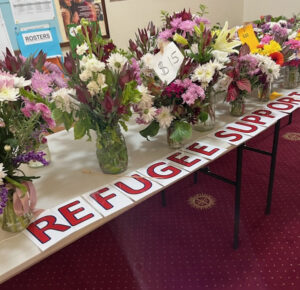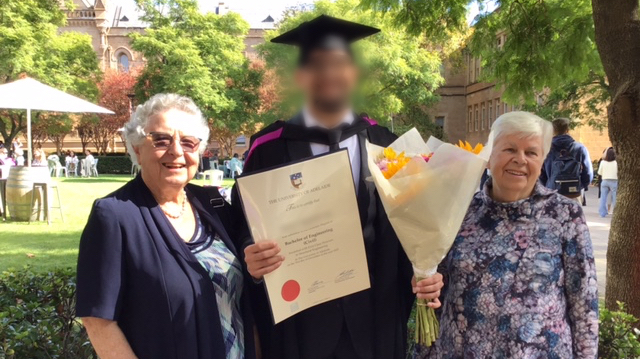Written by Julie Dow, volunteer St Ignatius Refugee Education Circle (Circle 106)
The dramatic headlines across the country of “Children Overboard” confronted Australians immediately preceding the 2001 Federal election. This issue generated very different, and often opposing, responses in the community. At St Ignatius Church one compassionate member posted an invitation on a notice board asking anyone concerned about refugees and asylum seekers to meet her in a local café the following Sunday morning.
A sizeable group appeared and together they set a meeting time to determine how to help refugees in our Adelaide community. They agreed that education was the right focus and that they should aim to establish scholarships to enable refugees to enrol in TAFE courses, or to undertake short practical and work-ready courses to help them into immediate employment. These decisions led to the formation of the group that became known as the St Ignatius Refugee Education Circle at the beginning of 2002.
At that time, I was a resident of a neighbouring suburb and concerned about these refugees but feeling powerless to help. Then I heard about and attended the group’s initial fundraising concert. Paying $20 for a concert ticket seemed an inadequate response. This compelled me to join the group in May 2002 to affirm my belief in the power of education to change lives and to help appease my social conscience. I had worked in education all my life and was immersed in the group’s education focus immediately. The following year I became treasurer, which foreshadowed an on-going commitment, sometimes as treasurer, chair or participating member.
Since joining the Refugee Education Group, I have developed a deep respect for the culture, endurance and resilience of our Australian refugee and asylum seeker cohort. I listen with respect to the harrowing stories of their transit to Australia, their subsequent experiences and challenges in managing day to day life with minimal financial and material resources, as well as their endurance.
I also hear their quiet frustration at being denied visas that allow them to resettle into permanent residence in this country, which seriously limits their capacity to participate fully in the workforce. As COFA members know, this has been going on for over ten years in some cases. There is little I can do to alleviate their sadness. Nonetheless, they continue renewing their short-term visas in the hope that they may one day be given permanent residency and our group continues to offer a small hand-up to help with their educational ambitions.
Over the years I have seen a shift in requests from assistance with short TAFE courses enrolment fees to more substantial expenses with more students enrolling in longer TAFE Certificate courses and University Degrees and less in the short work ready programs. With the longer courses comes requests for help to purchase textbooks, necessary technology, placement fees and compulsory student fees.
Regardless of the obstacles in their path, the students want to succeed and many have excellent academic results when they have the opportunity to engage in formal education. I see an intelligent cohort of new arrivals whose full participation in the life of the community will add to the richness of life for all when they are offered permanent residency. Most of all, I admire the women with their passion for education for themselves and their children, recognising that this is their route to a better life.
I admire and thank the compassionate parishioner who in 2001 had the foresight to encourage others to support the asylum seekers and refugees arriving in the wake of the Tampa incident. Her action led to the establishment of the St Ignatius Refugee Education Circle which now offers educational support to between 30 to 40 students each year.


